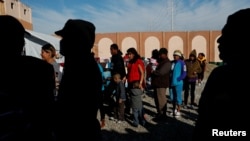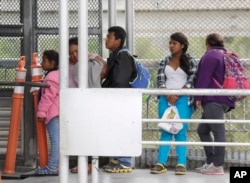The latest immigration policy from the Trump administration aims to force people seeking asylum to stay in Mexico.
During a hearing Thursday before the House Judiciary Committee, Department of Homeland Security Secretary Kirstjen Nielsen announced a partnership between the U.S. and Mexico under which migrants seeking asylum at the southern border must remain in Mexico while their cases are being processed in the United States.
"Today, we are announcing historic measures to bring the illegal immigration crisis under control," Nielsen said. "We will confront this crisis head on, uphold the rule of law and strengthen our humanitarian commitments."
Under the agreement between the two countries, "catch and release" will now be replaced with "catch and return," Nielsen said.
Children and Mexican nationals are excluded from the new policy, which, according to Nielsen, says that "individuals arriving in or entering the United States from Mexico — illegally or without proper documentation — may be returned to Mexico for the duration of their immigration proceedings."
According to reports, discussions between the two countries proceeded for months before the newly inaugurated Mexican president, Andres Manuel Lopez Obrador, took over.
The Mexican government released a statement in Spanish saying the country "reaffirms its sovereign right to admit or reject the entry of foreigners into its territory" but will allow certain foreign persons to stay in Mexico — for humanitarian reasons and temporarily — from within the United States who have entered through a port of entry or who have been apprehended between ports of entry and interviewed by U.S. immigration authorities, and have received a notice to attend a hearing before a judge.
2017 asylum rates
Administration officials said too many migrants make false claims, and 71 percent of them do not fulfill the asylum process.
Politifact, a fact-checking website that rates the accuracy of claims of government officials, reported that 2017 asylum rates were:
Grant rate: 20.22 percent;
Denial rate: 33.51 percent;
Other closure rate: 27.66 percent;
Administrative closure rate: 18.61 percent.
Other closure rates include cases that have been abandoned, not adjudicated, or withdrawn.
Asylum lawyer Jason Dzubow told VOA that as a matter of immigration law in general, a person who arrives at the border has a right to claim asylum.
"But as far as I can see, it doesn't specifically say where the person has to wait while they're waiting for that piece to happen. It seems to me that it's sort of nonsensical to say that the person is seeking asylum, but we're going to keep them in some other country," Dzubow said.
Under current law, people requesting asylum at the southern border — whether presenting themselves at a port of entry or crossing illegally between ports of entry — and who pass an initial credible-fear interview are allowed to stay in the country pending their application.
The Trump administration has moved to incarcerate migrants while the asylum process plays out. "Under our laws, if you don't have a legal right to be here, you will be detained," Nielsen told the Judiciary Committee.
To Dzubow, there is no question that litigation will be filed against this agreement between Mexico and the U.S. But the issue, he said, is complicated, and there is more than one argument against it.
"Let's just say Mexico has given me this offer to stay for a period of time, but I am scared to stay in Mexico. So, I'm seeking asylum from El Salvador and from Mexico. Typically, you can't seek asylum from a country that's not yours, but if it's a country that offered habitual residence, you can," he said.
Safety issues
Immigrant advocates and civil rights attorneys say that remaining in Mexico could be deadly to vulnerable families.
In a statement to reporters, Amnesty International executive director Margaret Huang said Mexico is not a safe country for all people seeking protection.
"Many people seeking asylum in the United States face discrimination, exploitation, sexual assault, murder or the possibility of being disappeared while traveling through Mexico or while forced to wait for extraordinarily long times in Mexican border towns. Women, children and LGBTI people could face heightened and unacceptable risks," Huang wrote.
According to a news release from the attorney general's office in the Mexican state of Baja California, two Honduran migrant teens who were in the process of moving to a new shelter in Tijuana, Mexico, were killed this week.
Authorities made three arrests and identified suspects as Esmeralda N., Carlos N. and Francisco Javier N.
Though Mexican police are still investigating the motive, the prosecutor's office said they were killed in an apparent robbery attempt.
On a background press call with reporters, a DHS official said Mexican officials "on their own accord" had determined they would provide all appropriate assistance to migrants under international law.
"When individuals are returned to a territory, a government needs to comply with those obligations in order to protect them," the official said.








